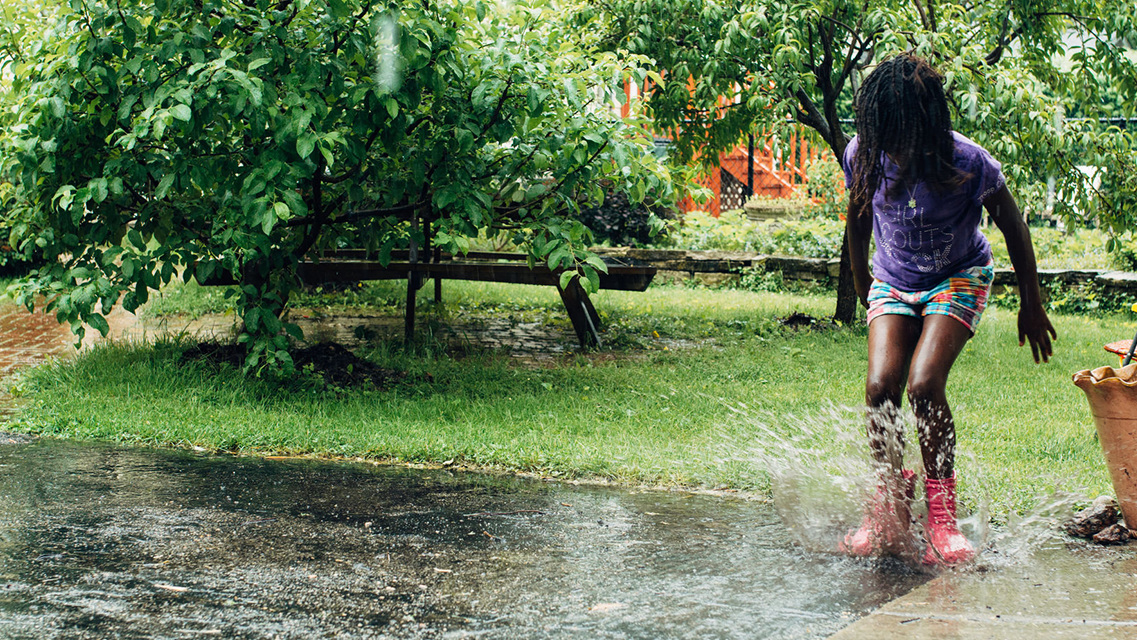Nature Nurture: Millennial Parents Go Outside
Nature, it seems, is having a moment. With people spending an estimated 90% of their time indoors, it is no wonder that nature, now so far removed from our lives, has been reintroduced as a novelty. We’re referring to the surface-level popularity of living walls, earthing, forest bathing, large-scale indoor tropics, and of course, Millennial’s love of houseplants, to name a few. But we’re also noticing how nature, on a more serious note, is influencing Millennial parents.
Nature’s positive influence (and effects of living without it) was a common theme throughout this year’s JWT Trend 100, and as we read it, started to connect some of their observations to a project we’ve been working on here at Ultra: Kidtopia. Kidtopia is a research-based perspective centered on what is happening in the lives of kids 3-17 and their families. Our Kidtopia work outlines four main age segments within 3-17, but the most common through-line in all of kids’ lives was screen time. Unsurprising, yes, but other than a steep decline in children's bicycle sales, nature or nature-implicated activities didn’t come up at all.
Technology has affected our relationship with nature, beyond screen time, in some very basic ways. Technology provides connections that eliminate the need to travel to see one another (and thus going through nature to get there). Why would kids ride a bicycle to see a friend down the street when they can Snapchat and FaceTime? Technology is also entertaining, and removes the need to go and find fun (and thus going to or through nature to find it). Fun is now at the tips of their fingertips – no need to go find it.
Parental styles and expectations around children's freedom in nature has also changed our relationship to it. Parenting styles have largely shifted away from unstructured, unsupervised child play outdoors to scheduled, supervised, indoor, collaborative time. Given the push for intensive hands-on parenting, it implicates parental involvement in any nature-oriented activity. This is quite the shift from a generation ago that let – nay, encouraged – children to play outside by themselves until the sun went down.
And societal expectations of how parents should parent and where kids belong has also shifted. In a 2015 memorable Maryland case, the parents of their then 6- and 10-year-old children were taken into custody and investigated for child neglect because they let their kids walk to the park alone. This led to the birth of the Free-Range Parenting movement and conversations around why kids aren’t outside as much – and why they are supervised so much. And it seems the conversation is still evolving: last year, Utah passed a “free-range parenting” bill that protects parents in letting their children play or walk to/from parks, among other things.
Millennial parents could shift this conversation more. In Gen Z @ Work, the writers reflect on the how over-scheduled “playdate culture” - while originally made with good intentions from their Boomer parents - created inabilities to cope with boredom or idle time: "Many Millennials are aware of this deficiency and they want their children to learn what to do with "boredom." Millennials are attempting to alleviate the playdate culture in exchange for a culture of free time where children have to find creative ways to entertain themselves…Another pendulum swing with Millennial parents results from watching how Xers have raised Gen Z. Driving by kids sitting in the backseat with headphones and playing on an iPad has made Millennials think twice about screen time. While they will admit they can be the greatest culprits themselves, they are working hard to instill some "digital detox." As cool as Xers thought it was to give their Gen Z kids a toy that could talk, walk, and blink lights, Millennial parents are stripping away the batteries and opting for simpler and tangible."
This perspective certainly resonates with recent camping data: Millennials constitute 40 percent of campers which Toby O’Rourke, president of KOA attributes to shifting priorities towards nature among Millennials: “As millennials start to have children, they’re more reflective of Gen X in their camping habits and seeing the value of getting their children outside.” And the RV world is taking notice, updating RV models and offerings to reflect the needs of a younger generation - and ones with children.
While anecdotal, these are the conversations happening in my Millennial parent circle, too. Some are looking to send their preschoolers to forest schools, we’ve swapped Richard Louv’s books and see outdoor play equipment as way to get and keep kids outside. Over the years, kid-size tee-pees and indoor-tents, faux plush campfires and Charley Harper everything has escalated in popularity, but the need now is not to replicate the outdoors indoors, but to get outside and be in nature.
REI, the outdoor retailer, caught onto this shift quickly. From their Smokey the Bear themed end-cap, #adulting badges and on-trend tin cups, REI recognized Millennials were rearing to get outside more than generations before them and are actively capturing their imaginations and gearing them up to get outside. Zara’s kid bedding collection campaign is another example clearly targeted at Millennial parents, and it hits all the right notes: kids outside in a bucolic field, immersed in nature, plenty of unstructured time to discover and imagine. It’s aspirational for how they want to raise their children and nostalgic of unstructured discovery days of their youth.
So, if nature is shaping Millennial parents’ decisions about their free time, family time and how they’ll raise their kids, it will certainly shape what they buy. How can brands then support a more nature-driven existence?

